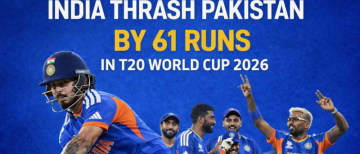Romance at the workplace has long been a subject of intrigue, debate, and sometimes concern. Yet despite evolving organisational policies and a stronger emphasis on professional boundaries, office relationships remain surprisingly common—especially in India. A new global study by Ashley Madison, conducted in partnership with YouGov, has revealed that India ranks second in the world for adults who admit to having been romantically involved with a colleague.
The findings come from a wide-ranging survey conducted across 11 countries—including the US, UK, Canada, Germany, Australia, Italy, Spain, Switzerland, Brazil, Mexico, and India. Covering a total of 13,581 adults, the research paints a striking picture of how workplace relationships continue to thrive, even in an age marked by HR guidelines, sensitivity training, and increasing awareness around consent and professionalism at work.

India Is the World’s Second-Highest Country for Workplace Romances
According to the study, 40% of Indian respondents said they are currently in, or have previously been in, a romantic relationship with a coworker. This places India just behind Mexico, where 43% of adults reported having engaged in an office romance. The numbers are noticeably higher compared to countries such as the US, UK, and Canada, where the figure hovers around 30%.
These findings highlight a key shift—office romances in India are not only happening but are also becoming more openly acknowledged.
Men More Likely to Admit Office Relationships Than Women
One of the study’s recurring patterns is a significant gender gap. Globally, among Ashley Madison members:
-
51% of men said they have dated a coworker
-
36% of women reported the same
This discrepancy suggests that men may either take more risks when it comes to mixing professional and personal life or are more willing to admit such relationships.
Concerns and Deterrents Also Vary by Gender
The study further reveals distinct fears associated with workplace romances:
-
29% of women said they avoid office relationships due to concerns over professional repercussions
-
27% of men shared this concern
This highlights that women are slightly more cautious about how a workplace romance could impact their career or reputation.
Conversely, men appear more worried about personal fallout:
-
30% of men fear personal consequences
-
26% of women feel the same
This dynamic suggests that while women weigh professional risks more heavily, men are more mindful of how a failed relationship could affect their emotional or personal lives.

Gen Z Employees Are the Most Cautious
The generational divide in the study stands out clearly. Among workers aged 18 to 24, 34% expressed concerns about how engaging in a workplace relationship could affect their career.
This caution reflects a growing awareness among younger employees regarding workplace ethics, the potential for power imbalances, and the broader implications such relationships may have. Gen Z’s workplace behaviour has often been described as boundary-conscious, and this data reinforces that narrative.
Workplace Romance in India: A Cultural Shift?
India’s high ranking in global office romance trends appears to align with a broader cultural transformation around relationships. The study suggests that increasing openness towards unconventional or non-traditional relationship structures may be influencing modern workplace dynamics.
Another survey—conducted by Gleeden, a dating platform for married individuals—found that:
-
35% of Indians are currently in an open relationship
-
41% said they would consider one if their partner suggested it
Interestingly, this shift is not limited to major cities. Smaller towns are also showing evolving attitudes. One example highlighted is Kanchipuram, which ranks among the highest in India for interest in extramarital affairs.
These changing perspectives around romance and relationship boundaries may be contributing to why Indians feel more comfortable pursuing—or admitting to—romantic connections at work.
Why Office Romances Continue Despite Risks
The findings reveal a contradiction: even with increased awareness of potential professional risks, office romances remain extremely common. But why?
1. Proximity and Familiarity
People spend a significant portion of their day at work. Shared goals, deadlines, and challenges can naturally foster emotional intimacy.
2. Growing Acceptance of Modern Relationships
As Indian society becomes more open to concepts like open marriages and extramarital relationships, the stigma around workplace romance may be gradually decreasing.
3. Discretion Matters
Ashley Madison’s internal member data showed that:
-
61% of members joined the platform for its discretion
-
Nearly one in four Indian women said they preferred not to date within their professional environment
This reinforces that while many Indians engage in romantic relationships, they also value privacy—and often seek avenues that allow them to explore romance discreetly.
Global Comparison: How Other Countries Rank
To place India’s second-place ranking in context, here’s how other countries compare in the study:
1. Mexico – 43%
Mexico tops the global list. Even a 2022 survey indicated that 6 out of 10 people acknowledged initiating workplace romances. Interestingly, this trend continues despite the rise in remote work, suggesting that emotional connection finds its way regardless of physical setting.
2. India – 40%
With nearly four in ten Indians reporting having dated a coworker, workplace romance remains deeply ingrained in Indian office culture. The trend persists even with more organisations introducing policies on professional conduct.
3. United States – ~30%
Office romances are common in the US, though companies often have clear guidelines to prevent misconduct and protect workplace morale. Approximately one-third of professionals admit to having dated a colleague.
4. United Kingdom – ~33%
The UK also sees high numbers, with nearly one-third of employees admitting workplace romances. However, concerns about privacy, favouritism, and gossip lead many organisations to formalise HR policies addressing such relationships.
5. Canada – ~30%
Canadian employees report similar figures. While relationships often grow organically through teamwork, HR frameworks are designed to address potential conflicts and maintain a respectful professional environment.
Changing Indian Workplaces: Policies vs. Reality
Even though Indian companies are increasingly implementing policies around sexual harassment, boundary training, and professional conduct, the survey indicates that workplace relationships remain prevalent. This suggests a nuanced reality:
-
People still form deep personal connections at work
-
Formal policies may not fully deter consensual relationships
-
The line between personal and professional life continues to blur
Employers, therefore, face the challenge of balancing employee autonomy with the need for a safe and respectful workplace.
What the Study Ultimately Reveals
The Ashley Madison–YouGov study is more than just a snapshot of office romance—it reflects:
-
Evolving relationship dynamics in India
-
Changing generational attitudes
-
Gender differences in risk perception
-
Growing openness to non-traditional romantic structures
-
Persistent workplace intimacy despite increased regulation
In essence, India’s second-place global ranking underscores a major cultural shift: modern Indian relationships are becoming more fluid, diverse, and openly acknowledged, even within the structured environment of the workplace.
Final Thoughts
Office romances in India are not only common—they are becoming more widely accepted, even as employees remain aware of the possible professional consequences. With nearly 40% of Indians admitting to workplace relationships, the country’s position just behind Mexico highlights a significant cultural transformation. As Indian attitudes evolve and organisations adapt, the intersection of professional life and personal intimacy continues to grow more complex, nuanced, and reflective of shifting societal norms.
With inputs from agencies
Image Source: Multiple agencies
© Copyright 2025. All Rights Reserved. Powered by Vygr Media.




















